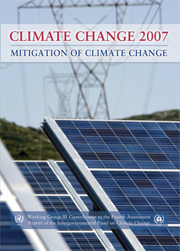 Climate Change 2007 - Mitigation of Climate Change
Climate Change 2007 - Mitigation of Climate Change Book contents
- Frontmatter
- Contents
- Foreword
- Preface
- Summary for Policymakers
- Technical Summary
- 1 Introduction
- 2 Framing issues
- 3 Issues related to mitigation in the long term context
- 4 Energy supply
- 5 Transport and its infrastructure
- 6 Residential and commercial buildings
- 7 Industry
- 8 Agriculture
- 9 Forestry
- 10 Waste management
- 11 Mitigation from a cross sectoral perspective
- 12 Sustainable Development and mitigation
- 13 Policies, instruments and co-operative agreements
- Annex I Glossary
- Annex II Acronyms, abbreviations and chemical compounds
- Annex III List of contributors
- Annex IV List of reviewers
- Index
9 - Forestry
- Frontmatter
- Contents
- Foreword
- Preface
- Summary for Policymakers
- Technical Summary
- 1 Introduction
- 2 Framing issues
- 3 Issues related to mitigation in the long term context
- 4 Energy supply
- 5 Transport and its infrastructure
- 6 Residential and commercial buildings
- 7 Industry
- 8 Agriculture
- 9 Forestry
- 10 Waste management
- 11 Mitigation from a cross sectoral perspective
- 12 Sustainable Development and mitigation
- 13 Policies, instruments and co-operative agreements
- Annex I Glossary
- Annex II Acronyms, abbreviations and chemical compounds
- Annex III List of contributors
- Annex IV List of reviewers
- Index
Summary
EXECUTIVE SUMMARY
During the last decade of the 20th century, deforestation in the tropics and forest regrowth in the temperate zone and parts of the boreal zone remained the major factors responsible for emissions and removals, respectively. However, the extent to which the carbon loss due to tropical deforestation is offset by expanding forest areas and accumulating woody biomass in the boreal and temperate zones is an area of disagreement between land observations and estimates by top-down models. Emissions from deforestation in the 1990s are estimated at 5.8 GtCO2/yr (medium agreement, medium evidence).
Bottom-up regional studies show that forestry mitigation options have the economic potential at costs up to 100 US$/tCO2-eq to contribute 1.3-4.2 GtCO2-eq/yr (average 2.7 GtCO2-eq/yr) in 2030. About 50% can be achieved at a cost under 20 US$/tCO2-eq (around 1.6 GtCO2/yr) with large differences between regions. Global top-down models predict far higher mitigation potentials of 13.8 GtCO2-eq/yr in 2030 at carbon prices less than or equal to 100 US$/tCO2-eq. Regional studies tend to use more detailed data and a wider range of mitigation options are reviewed, Thus, these studies may more accurately reflect regional circumstances and constraints than simpler, more aggregate global models. However, regional studies vary in model structure, coverage, analytical approach, and assumptions (including baseline assumptions). In the sectoral comparison in Section 11.3, the more conservative estimate from regional studies is used. Further research is required to narrow the gap in the potential estimates from global and regional assessments (medium agreement, medium evidence).
Information
- Type
- Chapter
- Information
- Climate Change 2007 - Mitigation of Climate ChangeWorking Group III contribution to the Fourth Assessment Report of the IPCC, pp. 541 - 584Publisher: Cambridge University PressPrint publication year: 2007
Accessibility standard: Unknown
Why this information is here
This section outlines the accessibility features of this content - including support for screen readers, full keyboard navigation and high-contrast display options. This may not be relevant for you.Accessibility Information
- 8
- Cited by